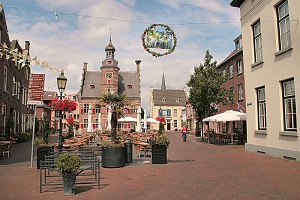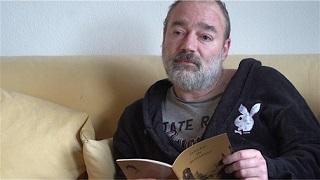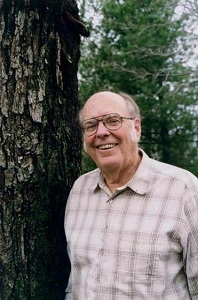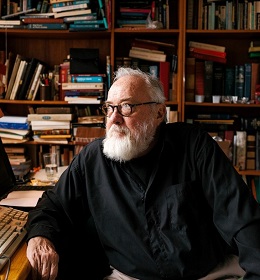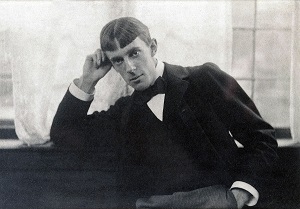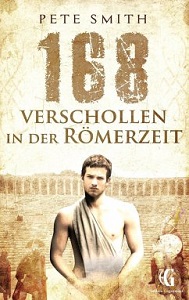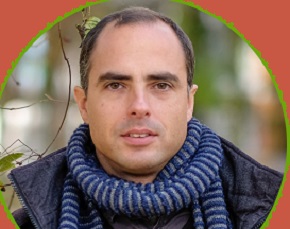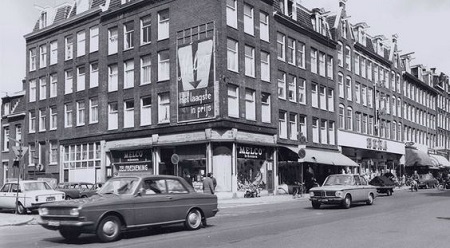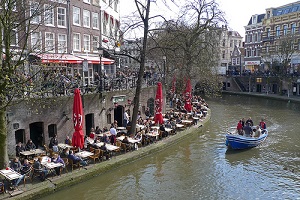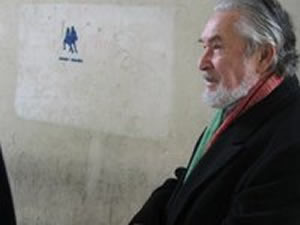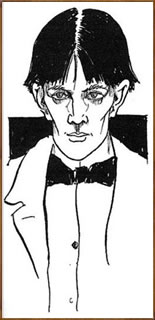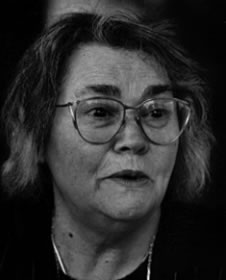De Nederlandse schrijver en dichter Rogi Wieg werd geboren op 21 augustus 1962 in Delft. Zie ook alle tags voor Rogi Wieg op dit blog.
Poëzie
Nu is het dus dat ik niet meer weet
hoe bang zijn was. Ik zal niet langer vijand
zijn van zoveel vormen goedheid. Maar vergeet
niet wat je was: ogen, haar, een hand
om mee te schrijven. En wat moet ik zeggen,
de stadsweg waarover je naar huis toe gaat,
mijn huis zelfs is zo liefdevol voor mij. Verleggen
van dit leven is gewichtig. dat je hier bestaat
alsof je altijd zal bestaan lijkt eigenaardig
– en al die mooie dingen dan –
om alles weg te gooien voor wat poëzie is te lichtvaardig.
Er is te weinig taal in mij om zaken
te omschrijven zoals dit gebrek aan angst;
dus noem ik maar wat afgebroken wordt, om nog iets goed te maken.
U bent
Toen U wegging brak U mijn hart.
Als U terug kon keren zou ik Uw nek breken.
Maar U heeft geen nek, alleen een onsterfelijke,
denkbeeldige lange hals, als van een fles van
dun glas die zich uitstrekt over het water van de zee,
glas met daarin de geschiedenis van alles.
Als U terug kon keren zou ik de tafel dekken,
het brood breken en de wijn drinken. Ik zou
mijzelf aan het kruis slaan van Uw bestaan.
U bent niet meer De Zoon en niet meer De Vader
U bent het onbezielde veld en de ruimtetijd.
U bent de onbezielde zwaartekracht en het verloop
van de lichtstraal bij nacht, U bent de wiskunde
zonder zachte geest, U bent r nu en bent er
altijd al geweest. U bent de symbolen die men leest.
Maar niet De Zoon en niet De Vader. Niet De Geest.
Toen U wegging brak U mijn hart.
Als U terug kon keren zou ik U hardhandig wurgen.
U bent ooit toen ik kind was in mijn huis geweest.
In alle dingen
Nu dan, die verschrikte vogel in je handpalm
is maar lijnenspel, want uitje huid
vloog niets meer op, zo was mijn verveling: kalm
verwachten hoe het middag werd. Hoe je niets besluit,
ook niet dat je slapen wilt, of dichter bij
mijn lichaam wilt. En zoals je zei de middag
viel; alleen wat helder ogenlicht. Geef mij
dit terug, een tijd die zonder angstval in mij lag.
Er komt weer regen over de rivier, koude
stedenlucht. Men leeft, beweging is alom
en verder gaan de dingen weer als lang geleden.
Je weet, ik ben een beetje angstig voor
mijn leven. Ik denk steeds vaker dat de som
van alles zinvol is. Misschien om wat wij deden.
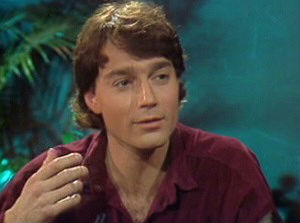
In 1980
De Amerikaanse dichter, schrijver, vertaler en bloemlezer X.J. Kennedy werd geboren in Dover, New Jersey op 21 augustus 1929. Zie ook alle tags voor X. J. Kennedy op dit blog.
Uit: A Hoarse Half-Human Cheer
“Open up in the name of the law,” Knox said.
The tube delivered a laugh. “Oh, the cops again? Always welcome.”
The
door buzzed and unlatched and they stepped into a long narrow hall
heavy with stale tobacco smoke. It led to a parlor that had three
loveseats and two big mohair couches. Red velvet wallpaper, a painting
of a nymph pursued by a satyr, and perched in the middle of a coffee
table, a punchboard from the Children’s Crusade.
A
friz-haired blonde in an abbreviated purple dress occupied one of the
loveseats with a patron, a plump sixtyish man in a striped business
suit, dangling a gold watch chain, resting an affectionate hand on her
nearer knee. They were sharing a drink out of a lipsticked glass. On a
couch a kid Moon’s age and a middle-aged man in a lumberjack shirt were
sitting. The kid was scrawny with pipe-stem arms and legs and a cap that
said CAPTAIN MARVEL. A young woman, wearing short shorts and a
rabbit-fur vest that hung open over her breasts, stood leaning against a
wall, smoking sullenly.
An
imposing matron with prominent jowls, double chins, handsome once, in a
gold evening gown and a necklace with a facsimile of the Star of India,
cruised up to them and greeted the cop like a long lost brother.
“Why,
Officer Branigan, where you been keeping yourself? Getting it at home
for a change? Say, I got you a new Latina named Dolores—”
Branigan’s
face turned a darker red. With a toss of his head he indicated Knox.
“Listen, Diane,” he said under his breath, “you don’t know me. This is
an official call.”
“What
you giving me?” the Madame shrilled. “I don’t need any more official
calls. I already gave to Sergeant Fitzroy for the Police Social Fund.
Who’s your friends?”
Moon
stood gazing at the young woman against the wall. She looked sulky,
resentful. His thumb revolved in his secret gesture of tribute, drawing
an imaginary circle around her face.
Knox poked him with an elbow. “Don’t get any ideas.”
Looking at Aisling, the madam said to Knox, “My God, that’s a beautiful woman you’ve got with you.”
“Thanks,” Aisling said. She turned on a winning smile.
“Suppose I wanted a job with you. What’s the salary like?
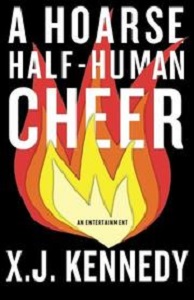
Cover
De Amerikaanse schrijver Robert Stone wed geboren op 21 augustus 1937 in New York. Zie ook alle tags voor Robert Stone op dit blog.
Uit: Dog Soldiers
“She supposed that she had meant it to. “Please,” Gerald said quickly. Jody looked uncertain. “I don’t know. Would it go?” “I think we should have a drink,” Gerald said. Marge moved the backpack with the pistols in it to the far edge of the bed and brought Gerald the bottle of Wild Turkey. “I’m afraid there aren’t any glasses.” “That’s all right,” Gerald said. He held the bottle toward the light, examining the texture of the whiskey. “Very fine stuff.” He took three large swallows and passed the bottle to his wife. Jody drank from it grimly. “Do you?” she asked Marge inclining the bottle. Marge took it and drank. For some reason it tasted sweet to her, like sherry. “Are you an addict?” Jody asked. “Certainly,” Marge said. Jody smiled intelligently. “No. Really.” “I don’t know if I am or not.” “Doesn’t that usually mean you are?” Marge shrugged. “How about him,” Gerald asked. “Is he?” “No.” “Aren’t there some funny moral areas there?” Jody asked. “I guess it depends on your sense of humor,” Marge said. Gerald had another drink. “We’re not here to judge,” he said. “There’s such a thing as personal necessity. Maybe it’s beyond moral areas.” Marge found that the liquor made her eyes ache. She closed them against the light, and leaned back on the pil-lows. She had already been told to shut up.
“You must be a terrific writer,” she said. Hicks and Eddie Peace huddled against the dark wall of the last bungalow. Eddie hugged his shoulders, his back to the wind. “Ridiculous,” Hicks said. “Ridiculous bullshit.” “I thought you’d be amused for Christ’s sake.” “Amused?” Hicks shivered. “You got a lot of nerve. What happened to the Englishman?” “I got news for you,” Eddie said, “your shit has a bad rap.” “Then there’s a misunderstanding.” “I don’t think so,” Eddie said. Hicks ran a hand over his hair. “Then get those assholes out of here.” Eddie shook his head in impatience. “You don’t understand, Raymond, that’s the misunder-standing. You don’t know how things work here. This guy has just been paid an absurd figure. His wife is an heiresS. I tell you these people have no conception of money.” “You’re the con man,” Hicks said, “not me. I’ve got qual-ity shit to sell — why do I want this insanity?” “Raymond,” Eddie said, “Raymond, try and learn some-thing. I deliver this goof into your hands.” He reached out, took Hicks’ right hand and squeezed it. “He’s a nice fella. He’s very polite.” “I don’t know what you’re talking about.” “Then you’re stupid, Raymond. I tell you your shit is a no-no around here. I’ll give you six thousand for what you can give me. And with a little imagination you can screw Gerald for a lot more. Listen, it would wipe you out what I’ve got working with those two. The guy is scared shit-less — even if he doesn’t know it yet. He’s gotta be dis-creet.” “You’ll give me what?” Hicks said. “What’s that figure again?” He put his hand on Eddie’s shoulder. “You just take it easy,” Eddie said.
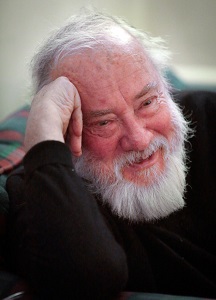
De Engelse dichter, schrijver en illustrator Aubrey Vincent Beardsley werd geboren op 21 augustus 1872 in Brighton. Zie ook alle tags voor Aubrey Bewardsley op dit blog.
Uit: Arthur Symons. A memoir (Aubrey Beardsley)
“This clear, unemotional intellect, emotional only in the perhaps highest sense, where emotion almost ceases to be recognisable, in the abstract, for ideas, for lines, left him, with all his interests in life, with all his sociability, of a sort, essentially very lonely. Many people were devoted to him, but he had, I think, scarcely a friend, in the fullest sense of the word ; and I doubt if there were more than one or two people for whom he felt any real affection. In spite of constant ill-health, he had an astonishing tranquillity of nerves ; and it was doubtless that rare quality which kept him, after all, alive so long. How far he had deliberately acquired command over his nerves and his emotions, as he deliberately acquired command over his brain and hand, I do not know. But there it certainly was, one of the bewildering characteristics of so contradictory a temperament.
One of his poses, as people say, one of those things, that is, in which he was most sincere, was his care in outwardly conforming to the conventions which make for elegance and restraint ; his necessity of dressing well, of showing no sign of the professional artist. ; He had a great contempt for, what seemed to inferior craftsmen, inspiration, for what I have elsewhere called the plenary inspiration of first thoughts; and he hated the outward and visible signs of an inward yeastiness and incoherency. It amused him to denounce everything, certainly, which Baudelaire would have denounced ; and, along with some mere ganiinerie, there was a very serious and adequate theory of art at the back of all his destructive criticisms. It was a profound thing which he said to a friend of mine who asked him whether he ever saw visions : ” No,” he replied, *’ I do not allow myself to see them except on paper.” All his art is in that phrase.
And he attained, to the full, one certainly of his many desires, and that one, perhaps, of which he was most keenly or most continuously conscious : contemporary fame, the fame of a popular singer or a professional beauty, the fame of Yvette Guilbert or of Cleo de Mdrode. . And there was logic in his insistence on this point, in his eagerness after immediate and clamorous success. Others might have waited ; he knew that he had not the time to wait._ After all, posthumous fame is not a very cheering prospect to look forward to, on the part of those who have worked without recompense, if the pleasure or the relief of work is not enough in itself. Every artist has his own secret, beyond the obvious one, of why he works.”
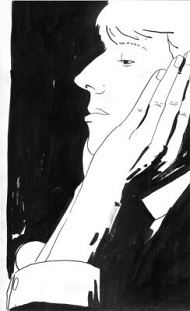
Zelfpotret
De Duitse schrijver Pete Smith werd op 21 augustus 1960 in Soest (Westfalen) geboren. Zie ook ook alle tags voor Pete Smith op dit blog.
Uit: Arm sind die anderen
„Mama
stahl sich ausgerechnet in der Nacht aus unserem Leben, in der ich mit
meinem Freund Agi durchs Bahnhofs-viertel streifte, eine Nacht wie ein
Traum, der sich lautlos heranschleicht, aufregend und fiebrig, eine
Nacht, die man nie vergisst, weil sie nie endet, die längste, die
dunkelste Nacht meines Lebens.
Wenn ich die Augen schließe, sehe ich
als erstes den Schnee. Flocken, die zu Boden schweben, die herum-wirbeln
und miteinander verschmelzen, die aufleuchten und verblassen, die vor
dem grauen Himmel tanzen und vor dem Weiß der Fassaden verschwinden. Der
Platz vor unserem Hochhaus, die Straßen, die Vorgärten, die Büsche und
Bäume, die parkenden Autos, der Müll — alles lag unter einer dicken,
weißen Decke begraben. Auf der Wiese zwi-schen unseren Häusern thronte
ein gigantischer Schnee-mann, dem irgendein Witzbold einen ebenso
gigantischen Ständer verpasst hatte. Am Rande der Gehwege warfen die
Räumfahrzeuge meterhohe Schneegebirge auf. Einen abseits gelegenen Hügel
hatten die Zwillinge aus dem drit-ten Stock festgestampft und
ausgehöhlt — seitdem krochen sie jeden Abend in ihre Höhle, um sich vor
ihrem besoffe-nen Alten zu verstecken.
Es war die Nacht vor
Heiligabend. Seit fünf Tagen schon schneite es ohne Unterlass. Die
Zeitungen würden später von einem Jahrhundertwinter schreiben, dabei
waren vom Jahrhundert erst zwei Jahrzehnte vergangen. Ich stand am
Küchenfenster und sah hinunter und überlegte, über die weiße Wiese zu
stapfen, um einmal im Leben der erste zu sein. Wie lange würde es
dauern, bis meine Spur unter neuem Schnee verschwand?
Gegen
Winterromantik und weiße Weihnacht und die Schwermut der Verlierer am
Ende eines Jahres bin ich im-mun. Aber in dieser Nacht …
Ich sah
hinaus und hoffte, dass irgendetwas geschah. Ein Wunder oder ein
Unglück, ein Anfang oder ein Ende, gleich was, Hauptsache, wir würden
auch morgen noch darüber sprechen oder besser sogar noch im nächsten
Jahr. Die Stille wuchs, eine eisige Kälte breitete sich in mir aus und
mit ihr das dumpfe Gefühl einer Bedrohung, ich hielt die Luft an,
wartete, doch nichts geschah.“

De Franse schrijver, scenarioschrijver, documentairemaker, filmer en politicus Frédéric Mitterrand werd geboren op 21 augustus 1947 in Parijs. Zie ook alle tags voor Frédéric Mitterand op dit blog.
Uit: La Mauvaise vie
« Quand
l’un des serveurs vient leur glisser à l’oreille qu’ils ont été
choisis, ils cochent une petite case sur un tableau avant de se diriger
vers le bar d’un air parfaitement dégagé et les autres garçons se
gardent poliment de commenter la transaction qui s’ébauche. La direction
relève sans doute le carnet de notes mural avant la fermeture. Une fois
que la réservation a été confirmée, après une présentation qui
s’éternise rarement, le garçon se rhabille prestement en coulisses, et
revient ; il n’y a plus qu’à régler les consommations, la commission au
club due par le client et à sortir au milieu des courbettes, des
marionnettes grimaçantes qui font office de loufiats et lancent d’une
voix suraiguë : Good night sire, see you again. On peut prendre deux
garçons, ou même plusieurs, aucune objection puisque la réponse est
toujours : I want you happy. Contrairement à une assertion généralement
colportée il y a peu de ruines sexuelles occidentales parmi le public,
la clientèle est en majorité locale, d’âge moyen, bien convenable et
sort en bande légèrement arrosée au whisky-Coca. Les quelques naufragés à
peau blanche du Spartacus font plutôt tache dans l’ensemble mais il est
vrai aussi qu’on leur propose les meilleures tables.
Evidemment,
j’ai lu ce qu’on a pu écrire sur le commerce des garçons d’ici et vu
quantité de films et de reportages ; malgré ma méfiance à l’égard de la
duplicité des médias je sais ce qu’il y a de vrai dans leurs enquêtes à
sensation ; l’inconscience ou l’âpreté de la plupart des familles, la
misère ambiante, le maquereautage généralisé où crapahutent la pègre et
les ripoux, les montagnes de dollars que cela rapporte quand les gosses
n’en retirent que des miettes, la drogue qui fait des ravages et les
enchaîne, les maladies, les détails sordides de tout ce trafic.
Je
m’arrange avec une bonne dose de lâcheté ordinaire, je casse le marché
pour étouffer mes scrupules, je me fais des romans, je mets du sentiment
partout ; je n’arrête pas d’y penser mais cela ne m’empêche pas d’y
retourner. Tous ces rituels de foire aux éphèbes, de marché aux esclaves
m’excitent énormément. La lumière est moche, la musique tape sur les
nerfs, les shows sont sinistres et on pourrait juger qu’un tel
spectacle, abominable d’un point de vue moral, est aussi d’une vulgarité
repoussante. Mais il me plaît au-delà du raisonnable. La profusion de
garçons très attrayants, et immédiatement disponibles, me met dans un
état de désir que je n’ai plus besoin de refréner ou d’occulter.
L’argent et le sexe, je suis au cœur de mon système ; celui qui
fonctionne enfin car je sais qu’on ne me refusera pas. Je peux évaluer,
imaginer, me raconter des histoires en fonction de chaque garçon ; ils
sont là pour ça et moi aussi. Je peux enfin choisir. J’ai ce que je n’ai
jamais eu, j’ai le choix ; la seule chose que l’on attend de moi, sans
me brusquer, sans m’imposer quoi que ce soit, c’est de choisir. Je n’ai
pas d’autre compte à régler que d’aligner mes bahts, et je suis libre,
absolument libre de jouer avec mon désir et de choisir.”
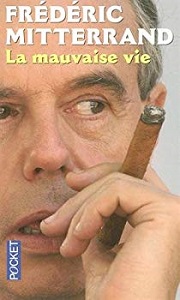
De Zwitserse schrijver, dramaturg en redacteur Lukas Holliger werd geboren op 21 augustus 1971 in Basel. Zie ook alle tags voor Lukas Holliger op dit blog.
Uit: Glas im Bauch
“Scheibenwischer
Die Drahtspange mit dem Gummibelag streift unaufhörlich das Wasser vom Glas. Zwei solche Spangen sind es, die sich an gegenüberliegenden Stellen um ihre Endpunkte drehen und mit den äußeren Spitzen Halbkreise beschreiben. Nur die Flächen innerhalb der Halbkreise werden vom Wasser befreit, und diese Flächen überschneiden sich. Abwechselnd fahren die Scheibenwischer durch die Schnittmenge, spritzen das mitgebrachte Wasser ins Revier des Nachbarn, der es, um eigenes Wasser ergänzt, zurückwirft. So winken beide nach links und nach rechts und spielen sich jedes Mal den Regen zu, zerstören jedes Mal den Halbkreis des Partners. Das Wimmern des Gummis ist im Wageninnern nur abgeschwächt zu hören. Kupplung, Cas-und Bremspedal tragen den Schmutz von Wanderschuhen. Auf dem Rücksitz eine Hundedecke. Alle Fenster-scheiben sind hochgekurbelt, die Knöpfe auf den geschlossenen Türflügeln heruntergedrückt. Der offene Aschenbecher wartet auf Asche. Der Geschwindigkeitszeiger liegt unter der Null. Nur die Scheibenwischer streiten weiter, schieben das Regenwasser hin und her und der Regenschauer wird grob, trommelt aufs Karosseriedach. Die Außenwelt verschwimmt. Die Wischer verlieren die Herrschaft über ihre Halbkreise, zerhacken sich trotzdem weiterhin die Grenzlinien. Die Schritte meines Vaters nähern sich über dem Kies. Seine Gestalt verdunkelt das Wageninnere, beugt sich über die Fahrertür, reißt sie auf. Der Regen wird echt. Viel zu viel Wind drängelt sich durch die offene Fahrertür, das Wasser erreicht den Rücksitz, meine Beine. Der Motor startet, die Scheinwerfer blenden das fallende Wasser. Mein Vater erwischt mich im Rückspiegel und die Scheibenwischer turnen zwei Stufen schneller““ .

De Duitse dichteres en schrijfster Elisabeth Alexander werd geboren op 21 augustus 1922 in Linz am Rhein. Zie ook alle tags voor Elisabeth Alexander op dit blog.
De foto
Het allerbelangrijkste
is de nagel
bij ontbreken
valt de kunst.
Sekt
Ook Duitse
prikkelt
is niet zo duur
en tenslotte
kun je achteraf
immers
vrijen op zijn Frans
Vertaald door Frans Roumen

Linz
De Russische dichter Gennadi Ajgi werd geboren op 21 augustus 1934 in het dorpje Sjajmoerzjino in de Tsjoewasjische republiek, aan de Wolga, 400 km ten oosten van Moskou. Zie ook alle tags voor Gennadi Aigi op dit blog.
Dag
en weer
die dromen in asfaltglans
nu eens van heuvels in gloed dan uitholling in zwart
als een vonkende vloedgolf
enormgrote kringen in
een oeverloze zee kikkerdril
en overdag verandert de asfaltarena
in iets dat veel lijkt op
toneelstellages uit Shakespeare’s tijden
en achter elke lantaarnpaal schemeren
bergen en rivieren – en vuurtorens
en reeds wordt stad tot zee
en sneeuwhopen, ijspegels, smeltwaterplassen
zijn niet anders dan de kammen
van een onzichtbare zee
en die zee is onstuimig door
sporen van auto’s – sleetjes – overschoenen
en de jaarlijkse vervlechting
van al die sporen, van alle tekens
wordt tot de deining van
een Stad-Zee
Mijn eigen
Ik moet
met mijn lippen
de grenzeloosheid van haar ogen bereiken
en mij dan verbazen over de nauw merkbare klop
in de aderen van het onderste ooglid
en begrijpen dat dit door hun doorzichtigheid komt
en hun onlichamelijkheid
zo licht en zo smartelijk
zijn die ogen die bijna niet trillen
en ik zal van haar houden met handen en lippen
en met mijn zwijgen en droom en de straten van mijn gedichten
en met de leugen – voor staten
en met de waarheid – voor leven
en met de perrons van alle spoorwegstations
waar ik eens voor het laatst zal verwijlen
voor een blik op de hete en zwarte ruggen
van locomotieven op rangeerterreinen
en haar laat ik over aan
in de rij staande mensen, aan toevluchtsoorden
in Siberië van kleine vreselijke steden
en van haar ga ik weg en voor goed
naar het slachthuis der mensen
van de eeuw ook die van mij…
Vertaald door Charles B. Timmer
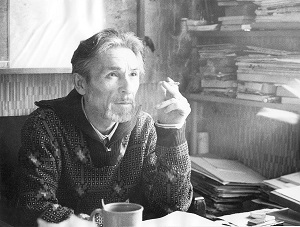
Zie voor nog meer schrijvers van de 21e augustus ook mijn blog van 21 augustus 2016 en ook mijn blog van 21 augustus 2016 deel 2.


